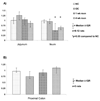Intestinal adaptation for oligopeptide absorption via PepT1 after massive (70%) mid-small bowel resection
- PMID: 21170601
- PMCID: PMC3050655
- DOI: 10.1007/s11605-010-1320-x
Intestinal adaptation for oligopeptide absorption via PepT1 after massive (70%) mid-small bowel resection
Abstract
Introduction: Proteins are absorbed primarily as short peptides via peptide transporter 1 (PepT1).
Hypothesis: Intestinal adaptation for peptide absorption after massive mid-small intestinal resection occurs by increased expression of PepT1 in the remnant small intestine and colon.
Methods: Peptide uptake was measured in duodenum, jejunum, ileum, and colon using glycyl-sarcosine 1 week (n = 9) and 4 weeks (n = 11) after 70% mid-small bowel resection and in corresponding segments from unoperated rats (n = 12) and after transection and reanastomosis of jejunum and ileum (n = 8). Expression of PepT1 (mRNA, protein) and villus height were measured.
Results: Intestinal transection/reanastomosis did not alter gene expression. Compared to non-operated controls, 70% mid-small bowel resection increased jejunal peptide uptake (p < 0.05) associated with increased villus height (1.13 vs 1.77 and 1.50 mm, respectively, p < 0.01). In ileum although villus height increased at 1 and 4 weeks (1.03 vs 1.21 and 1.35 mm, respectively; p < 0.01), peptide uptake was not altered. PepT1 mRNA and protein were decreased at 1 week, and PepT1 protein continued low at 4 weeks. Gene expression, peptide uptake, and histomorphology were unchanged in the colon.
Conclusions: Jejunal adaptation for peptide absorption occurs by hyperplasia. Distal ileum and colon do not have a substantive role in adaptation for peptide absorption.
Figures





References
-
- Lloyd DA, Vega R, Bassett P, Forbes A, Gabe SM. Survival and dependence on home parenteral nutrition: experience over a 25-year period in a UK referral centre. Aliment Pharmacol Ther. 2006;24:1231–1240. - PubMed
-
- Messing B, Crenn P, Beau P, Boutron-Ruault MC, Rambaud JC, Matuchansky C. Long-term survival and parenteral nutrition dependence in adult patients with the short bowel syndrome. Gastroenterology. 1999;117:1043–1050. - PubMed
-
- Williamson RC. Intestinal adaptation (second of two parts). Mechanisms of control. N Engl J Med. 1978;298:1444–1450. - PubMed
-
- Williamson RC. Intestinal adaptation (first of two parts). Structural, functional and cytokinetic changes. N Engl J Med. 1978;298:1393–1402. - PubMed
Publication types
MeSH terms
Substances
Grants and funding
LinkOut - more resources
Full Text Sources

